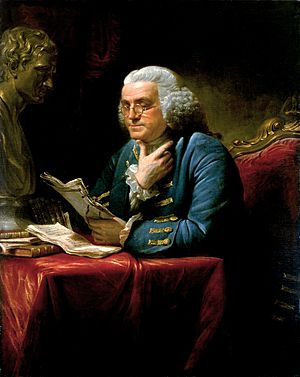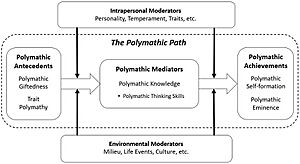Polymath facts for kids

A polymath is someone who knows a lot about many different subjects. They are known for using knowledge from various areas to solve problems. The word comes from Greek and Latin words meaning "having learned much" or "universal human."
During the Renaissance, people believed humans could learn and develop endlessly. This idea led to the term Renaissance man. It describes talented people from that time who tried to develop their skills in all areas. This included intellectual, artistic, social, physical, and spiritual abilities.
Contents
What Does "Polymath" Mean?
The word "polymathy" first appeared in a book in 1603 by Johann von Wowern. He was a philosopher from Hamburg. Von Wowern said polymathy was "knowledge of various matters, drawn from all kinds of studies." It meant freely exploring all fields of learning.
The English word "polymath" was first used in 1624. The similar term "polyhistor" appeared even earlier, in the late 1500s.
The Renaissance Man
The term "Renaissance man" became popular in English in the early 1900s. It describes great thinkers from before, during, or after the Renaissance.
Leonardo da Vinci is often called the best example of a Renaissance man. He had a huge desire to learn and a very creative mind. Many famous polymaths lived during the Renaissance. This was a cultural movement from the 14th to the 17th century. It started in Italy and spread across Europe.
People at this time believed in a well-rounded education. A gentleman was expected to speak several languages. They also needed to play a musical instrument and write poetry. This was part of the Renaissance ideal.
The idea of a "universal education" was key to becoming a polymath. This is why we have the word university. Back then, universities did not focus on just one area. They taught students many subjects like science, philosophy, and religion. This broad education gave them a base. From there, they could become experts in a specific field.
Today, when someone is called a "Renaissance man," it means they have deep knowledge. They are skilled or even experts in several different fields. It's more than just having many interests.
Polymathy in Learning
Many experts have studied polymathy. They want to understand how people learn across different fields.
How Do Polymaths Think?
Robert Root-Bernstein is a key researcher in polymathy. He compares polymaths to specialists and dilettantes. A specialist knows a lot about one thing. A dilettante knows a little about many things, but not deeply.
A polymath, however, puts a lot of effort into their hobbies and interests. They use these different interests to help their main work. Root-Bernstein believes that the creative process is the same in all fields. Whether you are painting or solving a math problem, you use similar mental tools. This is why many innovative scientists have artistic hobbies. And many creative artists are interested in science.
His research shows that creativity is not just for one area. It's about combining different ideas, skills, and knowledge in new ways. Polymathy is a big source of a person's creative potential.
Root-Bernstein and his team also looked at different ways people develop creativity:
- Some people become experts in one talent early in life.
- Others try many creative things before choosing one main path.
- Some polymaths work on many careers at the same time.
- Some start with one talent but then explore more creative areas as they get older.
- Others focus on one creative field at a time, moving from one to another.
These studies suggest that understanding polymaths can help us improve education. We can teach students skills that help them learn and create across many subjects.
Why Are Polymaths Important Today?
Peter Burke, a history professor, has studied polymaths through history. In ancient times, scholars didn't have to specialize. But from the 1600s, new knowledge grew very fast. It became hard for one person to master many subjects.
So, polymaths became less common. It was harder to make original contributions in many fields. Today, it's more common to find "passive polymaths." These people learn about many areas but are famous for one. "Proper polymaths" are rare. They make important contributions to several fields.
Burke says that in our age of specialization, polymaths are more important than ever. They can connect different ideas and see the big picture. They can also find knowledge that might get lost between different subjects. He suggests that schools and governments should help polymaths thrive. They should offer ways for people to work across different subjects.
How Can Education Help Polymaths?
Bharath Sriraman, a professor at the University of Montana, also looked at polymathy in education. He thinks ideal education should help students develop talents. It should let them explore many research fields. It should also help them see connections between math, arts, and sciences.
His research found that students who thought like polymaths were better at solving complex problems. He suggests that encouraging polymathy in the classroom can help students. It can help them discover new ways of thinking and connect different subjects.
A Model for Developing Polymathy
Michael Araki, a professor in Australia, created a model for how polymathy develops. His Developmental Model of Polymathy (DMP) has five main parts:
- Things that come before polymathy (like natural talents).
- Things that help polymathy grow (like effort).
- What polymaths achieve.
- Inner factors (like personality).
- Outside factors (like opportunities).
Araki says that polymathy has three main parts:
- Breadth: This means having wide and diverse knowledge. It's the opposite of knowing only a little about one thing. Great polymaths know a lot about very different areas.
- Depth: This means having deep and detailed knowledge. It's not just knowing a little bit about something. Polymaths learn things very thoroughly.
- Integration: This is the ability to connect different ideas and subjects. Polymaths can link ideas that seem separate to others. They can also combine their different activities into one strong whole.
Araki also sees polymathy as a "life project." Depending on a person's personality and opportunities, becoming a polymath might be more or less appealing or possible.
Everyone's Creative Potential
James C. Kaufman and Ronald A. Beghetto, professors from the University of Connecticut, studied if everyone has the potential for polymathy. They also looked at whether creativity is specific to one area or general.
They believe that everyone has "mini-c polymathy," which is everyday creativity. They also suggest that to reach high levels of creativity, you need three things:
- Intelligence.
- Motivation to be creative.
- An environment that allows creative expression.
Polymaths have the motivation and ability to explore many different subjects. Kaufman and Beghetto suggest that teachers should help students connect ideas across different subjects. They should also encourage students to express their ideas in many ways, like drawings or videos.
The Polymath Mindset
In his 2018 book The Polymath, British author Waqas Ahmed says polymaths are people who have made important contributions to at least three different fields. He believes that everyone has the potential to be a polymath. People naturally have many interests and talents.
Ahmed argues against "the cult of specialization." He says that our education systems often force students to focus on narrow topics. This stops them from developing all their talents. He believes that specialization, which came from the Industrial Revolution, is bad for both individuals and society. The complex problems of today need the creativity and broad views of polymaths.
For individuals, Ahmed says specialization can make people feel less human. Polymathy, however, helps people express themselves fully and live more fulfilling lives. For society, answers to problems often come from combining knowledge from different areas. Many important problems are complex and can't be understood through just one specialized field.
Ahmed also says we should combine thinking and doing, and art and science. He believes that action and thought support each other. People do best when they have diverse experiences and knowledge. He notes that successful people often say their hobbies helped them succeed.
Ahmed points out that developing many talents can help you succeed even in a specialized field. For example, Nobel Prize-winning scientists are 25 times more likely to sing, dance, or act than average scientists. He argues that exploring different areas can make a person smarter overall.
He also shares historical ideas about the benefits of polymathy. Aristotle believed that truly understanding a topic needed not just subject knowledge, but also general critical thinking. Another benefit is using many approaches to understand one issue. Biologist E. O. Wilson said that reality is best understood by combining different academic subjects.
Studying many approaches helps you be open-minded. If you only know one way of thinking, an answer might seem simple. But if you know different ideas, you'll be more open and aware of what you don't know. Ahmed says recognizing these limits is "the essential mark of the polymath."
Famous Polymaths
Many famous polymaths have excelled in science, technology, engineering, math, and the arts. Here are some well-known examples:
- Avicenna
- Leonardo da Vinci
- Michelangelo
- Robert Hooke
- Gottfried Wilhelm Leibniz
- Al-Biruni
- Hildegard of Bingen
- Ibn al-Haytham
- Rabindranath Tagore
- Mikhail Lomonosov
- Johann Wolfgang von Goethe
- Alan Turing
- Benjamin Franklin
- John von Neumann
- Omar Khayyam
- Charles Sanders Peirce
- Henri Poincaré
- Isaac Asimov
- Nicolaus Copernicus
- René Descartes
- Aristotle
- Frederick II, Holy Roman Emperor
- Averroes
- Archimedes
- Hypatia
- Blaise Pascal
- Isaac Newton
- Leonhard Euler
- Émilie du Châtelet
- Nikola Tesla
- Thomas Edison
- Florence Nightingale
- Bertrand Russell
- B. R. Ambedkar
- Thomas Young
- Sequoyah
- Thomas Jefferson
- Maya Angelou
- Friedrich Engels
- Satyajit Ray
Other Similar Words
Besides "Renaissance man," other terms are used. These include homo universalis (Latin) and uomo universale (Italian). Both mean 'universal man'.
The term generalist is also used. This is someone who knows a lot about many things, unlike a specialist who focuses on one area.
The term universal genius or versatile genius is also used. Leonardo da Vinci is again a great example. This term is for people who made lasting contributions in several fields. They also had a broad approach to their work.
When someone has encyclopedic knowledge, it means they know a huge amount about many subjects.
See also
 In Spanish: Polimatía para niños
In Spanish: Polimatía para niños
- Amateur
- Competent man
- Creative class
- Genius
- Interdisciplinarity
- Jack of all trades, master of none
- Multipotentiality
- Opsimath
- Philomath
- Polyglotism
- Polygraph (author)
- Polymatheia – a muse of knowledge in Greek mythology
 | Lonnie Johnson |
 | Granville Woods |
 | Lewis Howard Latimer |
 | James West |


